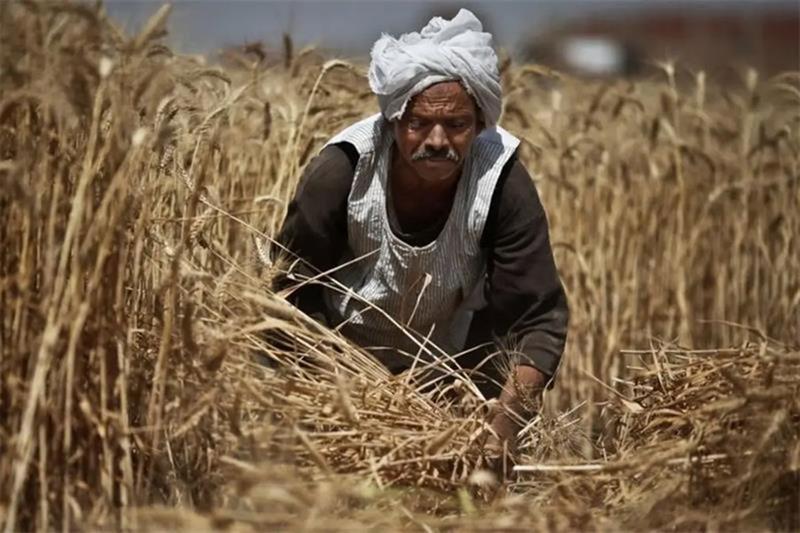
File Photo: An Egyptian farmer in a wheat field. AP
Moselhi made the statement amid fears of a disruption in wheat supplies due to the ongoing Russian invasion of Ukraine, as Russia and Ukraine provide the majority of Egypt’s wheat imports.
In 2021, Egyptian farmers supplied 3.5 million tonnes of wheat, a key strategic commodity that secures the staple food of bread for tens of millions of Egyptians.
Moselhi said that Egypt, the largest wheat importer in the world, currently relies on 14 countries for wheat imports, including Russia, Ukraine, the US, France, Romania, and Kazakhstan.
However, Egypt depends on Russia and Ukraine for 80 percent of its wheat imports; 50 percent from Russia and 30 percent from Ukraine.
Russia and Ukraine together account for 29 percent of the world’s wheat exports, according to the Wheat Outlook report for 2022 issued by the US Department of Agriculture.
In 2021, Egypt imported 5.5 million tonnes of wheat, according to data released by the supply ministry in December.
Egypt’s wheat imports cost EGP 20-22 billion, while locally produced wheat costs around EGP 18 billion, Moselhi said.
The global price of wheat increased from $250 per tonne to between $334 and $350 – an increase of about $100 in less than one year, the minister added.
Egypt’s strategic reserves of wheat – 3.2 million tonnes – are sufficient for up to four months, the minister said, adding that about half-a-million tonnes of local wheat have been stored from last year.
Moselhi said Egypt cancelled tenders to buy wheat from France and the US on Monday because the hard wheat offered in the tender is more suitable for pasta than bread.
Prime Minister Mostafa Madbouly has issued instructions to increase the number of wheat collection points and easing procedures to facilitate the delivery of wheat from small farmers, Moselhi said in an interview with ‘Ala Masoliety’ TV programme on Sada Elbalad.
In February, the Egyptian government confirmed that it will raise the price of subsidised bread loaves – sold at 5 piastres for over 30 years – but will make sure that the neediest and most marginalised citizens are not affected.
Egypt has imported wheat from four countries so far in 2022; 43 percent from Romania, 29 percent from Russia and 23 percent from Ukraine, said Moselhi.
The rest of the imported wheat came from France and others, Moselhi said.
The minister noted that Egypt’s contracts to import wheat from Russia are still valid, saying that Russia and Ukraine are trying to fulfil their wheat export commitments.
Meanwhile, the Egyptian government has announced plans to diversify its wheat import sources amid the Russia-Ukraine conflict.
This includes buying wheat from countries outside Europe, such as the US, Argentina, Canada, and Paraguay, Cabinet spokesperson Nader Saad told media outlets in February.
This year, the area of land cultivated with wheat in Egypt reached 3.6 million feddans, Moselhi said, adding that the country aims to produce between 9 to 10 million tonnes of wheat in the future.
The area of cultivated land in the Toshka project, south of Upper Egypt’s Aswan, is expected to increase to 1 million feddans by 2025, Moselhi said, noting that this will save about $1 billion in the country’s wheat budget.
In December, President Abdel-Fattah El-Sisi inaugurated land reclamation projects in Toshka to help Egypt move toward self-sufficiency in wheat.
Moselhi added that the ongoing National Project of Silos will help store wheat for a period ranging from 12 to 18 months.
The silos’ current storage capacity is 3.4 million tonnes and the state is planning to build 60 grain field bins, he added.
Short link: